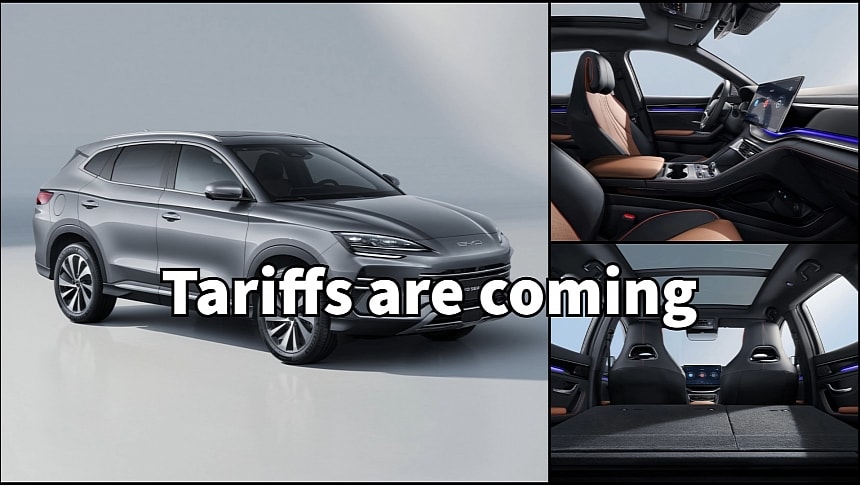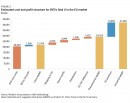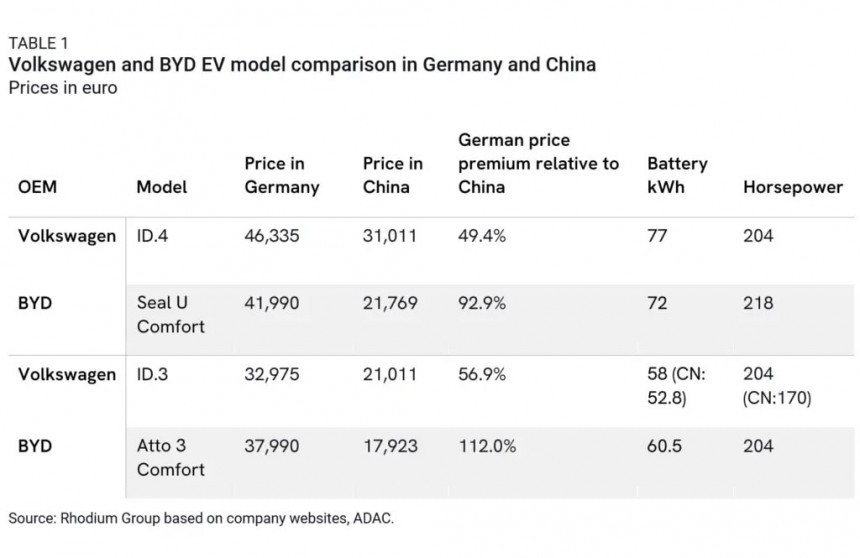The European Union announced higher tariffs on China-made electric vehicles imported into Europe. The measure was justified because of "excessive" government subsidies that amount to unfair competition. However, the new tariffs may not have the expected outcome, as Chinese EVs would still be profitable. However, a likely retaliatory measure will put European carmakers in a difficult situation.
After the US announced 100% tariffs on Chinese electric vehicles, the European Union followed suit and announced a similar move, albeit at a much smaller scale. Starting July 4, electric vehicles produced by BYD, Geely, and SAIC would have to pay tariffs of 17.4%, 20%, and 38.1%, respectively. This is on top of the current 10% tariff on imported Chinese EVs.
The individual carmakers listed above were chosen as "sampled" Chinese producers, but the tariffs are not just for them. Other Chinese carmakers that cooperated with the European Commission's anti-subsidy investigation (but not sampled) will get the weighted average duty of 21% on their EVs. Those who did not cooperate will face a 38.1% tariff, with SAIC as an example.
Like the US, the new tariffs will not help prevent Chinese carmakers from selling their EVs in Europe. The most important difference between the two entities is that the US doesn't import many vehicles from China, whereas Chinese-made EVs have already flooded Europe. Even European carmakers (and Tesla, too) import some of their models from China, which means they will also be affected.
There are many ways in which Chinese carmakers can avoid paying the new duties, including by establishing production facilities on the Continent. BYD is already building a car factory in Hungary, and other carmakers are following in its footsteps. Analysts are optimistic that the EU's new "punishment" tariffs will limit Chinese imports, but this might prove wishful thinking.
Even considering the 27.4% tariffs BYD will have to pay to sell its vehicles in Europe, the Chinese carmakers make more profit than in China. A recent report by Rhodium Group shows that BYD makes a profit of $15,400 on every Seal U (a compact crossover) sold in Europe, compared to only $1,400 in China. Even with a 30% duty, BYD would still make about $5,000 more selling the Seal U in Europe than in China.
Although the new tariffs seem excessive, they are far from making Europe an unattractive market for Chinese carmakers. They have enough space to lower their prices in order to gain market share. This means the competition will still affect European carmakers, especially if Chinese rivals engage in a price war. Remember, Chinese EVs are really good, with some being much better than anything German or French carmakers can produce at the moment.
If Europeans really want to make life difficult for Chinese companies, they will have to raise the tariffs even further, possibly above 50%. However, this would put European carmakers that use China to export to Europe in a difficult position. These include BMW, Volvo, and Renault. Volkswagen and others also considered China to be an export hub for the EU market. Even the 21% weighted average duty would suck the air out of their lungs.
Tesla, which exports the Model 3 from Giga Shanghai to Europe, is already warning potential buyers to place an order before the new tariffs enter into effect. "We expect to have to increase Model 3 prices starting July 1, 2024, due to additional import duties that will likely be imposed on all electric vehicles manufactured in China and sold in the EU," writes the note on Tesla's website. The note visible in the Model 3's Design Studio doesn't specify the expected price increase.
Tesla was one of the companies that cooperated with the European Commission's investigation and, therefore, will be subject to a lower tariff of 21%. However, the Commission added that Tesla could receive an individually calculated rate of duty on its China-made EVs when definitive tariffs are imposed in November. This shows there's still room for negotiations, and the final proposal might look very different for cooperating companies.
This is still not considering any retaliatory measure China might take. China will not leave this unpunished and, in effect, has already signaled this, saying that the new tariffs would "harm Europe's interest." This is one of the reasons why some European governments have opposed the tariffs. The German car industry is heavily invested in China and thus vulnerable to China's counter-measures. A tit-for-tat response would affect German businesses more than the new tariffs affect Chinese carmakers.
Whatever the outcome, the times of free trade and globalization are behind us. Everyone will try to protect its economy as much as possible without leaving rivals much on the table. The consumers will be the biggest losers in the new trade war that is brewing between China and the Western economies. Paying more for an electric vehicle might not be the worst part.
The individual carmakers listed above were chosen as "sampled" Chinese producers, but the tariffs are not just for them. Other Chinese carmakers that cooperated with the European Commission's anti-subsidy investigation (but not sampled) will get the weighted average duty of 21% on their EVs. Those who did not cooperate will face a 38.1% tariff, with SAIC as an example.
Like the US, the new tariffs will not help prevent Chinese carmakers from selling their EVs in Europe. The most important difference between the two entities is that the US doesn't import many vehicles from China, whereas Chinese-made EVs have already flooded Europe. Even European carmakers (and Tesla, too) import some of their models from China, which means they will also be affected.
There are many ways in which Chinese carmakers can avoid paying the new duties, including by establishing production facilities on the Continent. BYD is already building a car factory in Hungary, and other carmakers are following in its footsteps. Analysts are optimistic that the EU's new "punishment" tariffs will limit Chinese imports, but this might prove wishful thinking.
Although the new tariffs seem excessive, they are far from making Europe an unattractive market for Chinese carmakers. They have enough space to lower their prices in order to gain market share. This means the competition will still affect European carmakers, especially if Chinese rivals engage in a price war. Remember, Chinese EVs are really good, with some being much better than anything German or French carmakers can produce at the moment.
If Europeans really want to make life difficult for Chinese companies, they will have to raise the tariffs even further, possibly above 50%. However, this would put European carmakers that use China to export to Europe in a difficult position. These include BMW, Volvo, and Renault. Volkswagen and others also considered China to be an export hub for the EU market. Even the 21% weighted average duty would suck the air out of their lungs.
Tesla, which exports the Model 3 from Giga Shanghai to Europe, is already warning potential buyers to place an order before the new tariffs enter into effect. "We expect to have to increase Model 3 prices starting July 1, 2024, due to additional import duties that will likely be imposed on all electric vehicles manufactured in China and sold in the EU," writes the note on Tesla's website. The note visible in the Model 3's Design Studio doesn't specify the expected price increase.
This is still not considering any retaliatory measure China might take. China will not leave this unpunished and, in effect, has already signaled this, saying that the new tariffs would "harm Europe's interest." This is one of the reasons why some European governments have opposed the tariffs. The German car industry is heavily invested in China and thus vulnerable to China's counter-measures. A tit-for-tat response would affect German businesses more than the new tariffs affect Chinese carmakers.
Whatever the outcome, the times of free trade and globalization are behind us. Everyone will try to protect its economy as much as possible without leaving rivals much on the table. The consumers will be the biggest losers in the new trade war that is brewing between China and the Western economies. Paying more for an electric vehicle might not be the worst part.





















